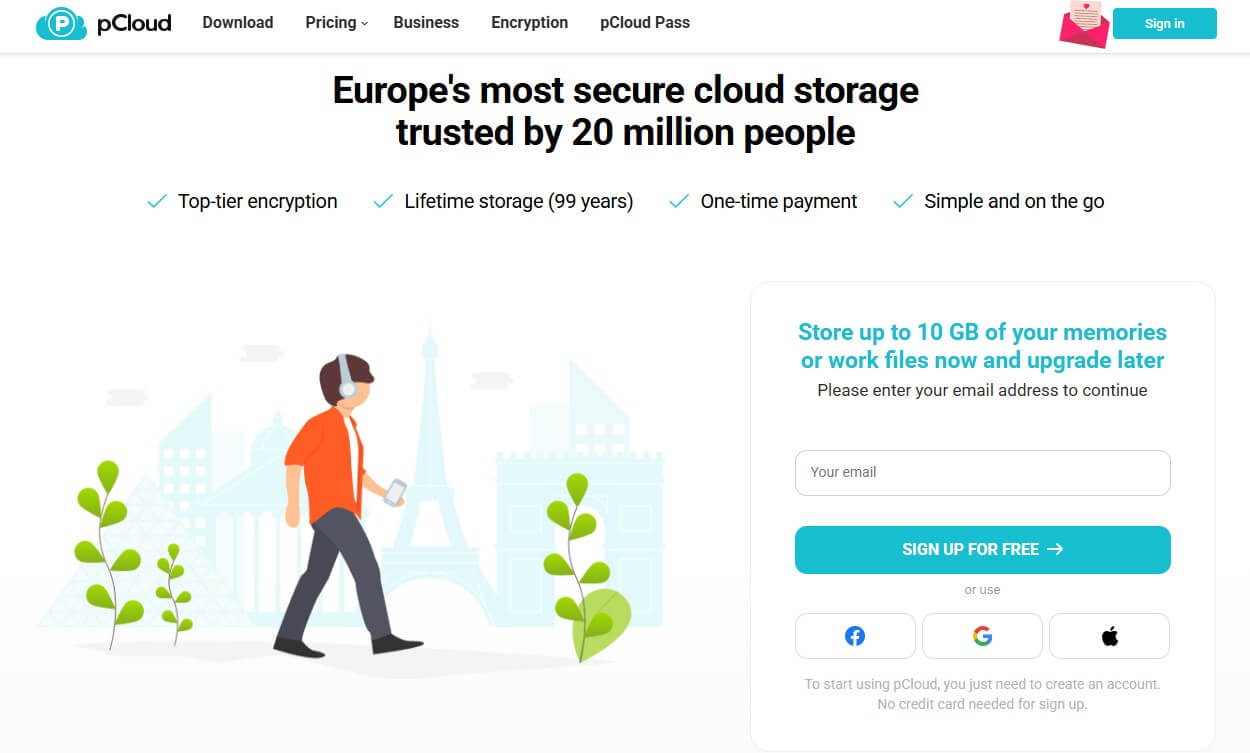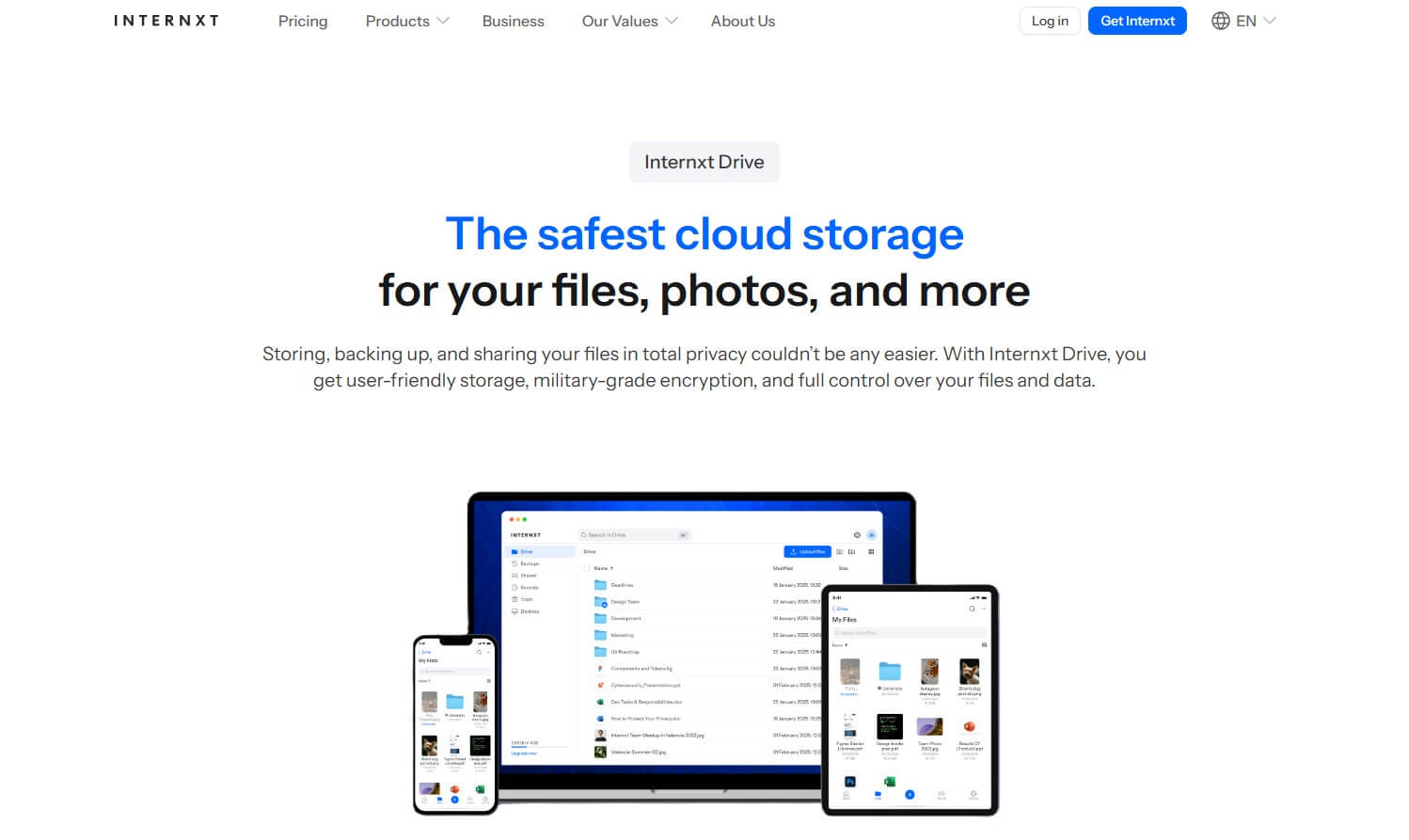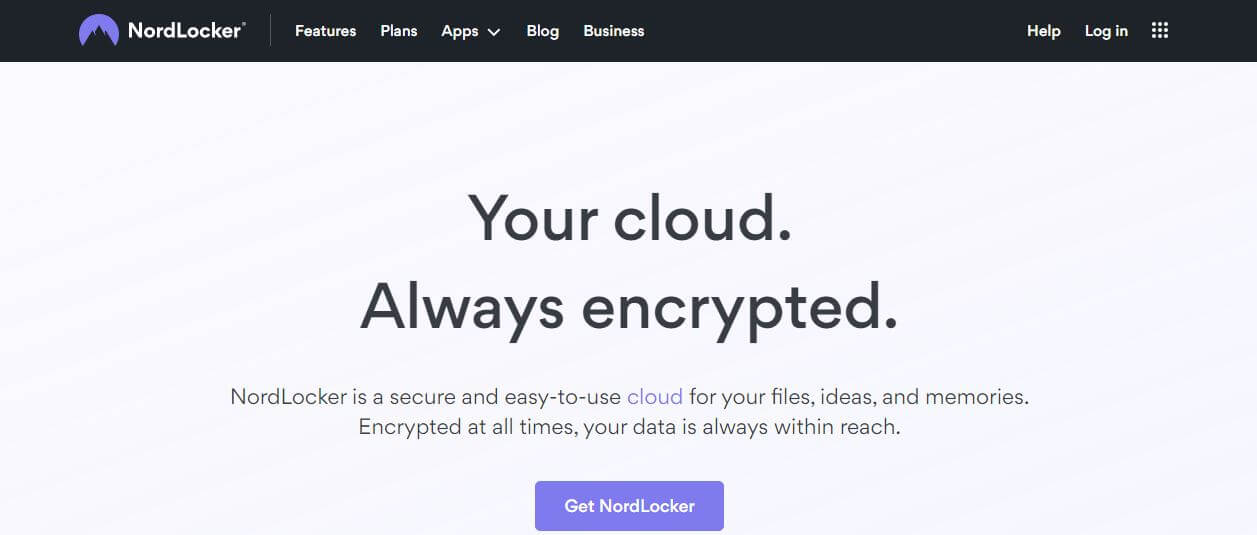Apple launched its own cloud service called iCloud in 2011. Arguably, this is not the best cloud storage provider by any stretch, although it has a small group of people who enjoy it. After all, if you have an iPhone or iPad, you’ve most likely had a glimpse of what it has to offer.
However, people often look for iCloud alternatives simply because it’s not up to par with its competitors. While lacking some of the important features, it’s also not very secure due to Apple’s intrusive privacy policy.
This, then, begs the question – what are the best iCloud alternatives? Luckily, we have three of them in mind, so I suggest you stay along for the ride to learn more about them, as well as why iCloud isn’t as good as you think.
Summary: 5 Best Alternatives to iCloud in 2025
- pCloud – best iCloud alternative overall
- Internxt – fast and dependable iCloud replacement
- NordLocker – best for privacy and security
- Google Drive – a great alternative to iCloud for benefiting from Google’s application ecosystem
- Dropbox – easy-to-use cloud storage service
Why Should You Look for iCloud Alternatives?
Being a product of Apple, people tend to think very highly of this cloud storage service. In reality, this is a very limited product that has some serious flaws, making it not worth the money. With that said, here’s why you should maybe seek iCloud alternatives:
Poor Performance
Right off the bat, you’ll notice that the service isn’t particularly fast.
Of course, we’re talking about upload and download speeds that aren’t up to par with some of its competitors. Our tests showed that iCloud is significantly slower than pCloud, Internxt, or NordLocker, regardless of the platform.
pCloud, the best alternative to iCloud
Thus, if you need to upload larger files or high-definition videos, you better have some patience. Obviously, Apple needs to work on its infrastructure to bring better performance to the table.
Otherwise, with average speeds and higher prices, this service surely isn’t worth the money.
Privacy & Security Issues
Apple is a company that puts privacy further down the list of priorities. As is the case with its rival company Google (you can check the best Google Drive alternatives here), Apple won’t be too shy when it comes to invading your privacy and scrolling through your files and documents.
A testament to that is Apple’s new neuralMatch tool. It allows the company to scan your photos on iCloud in a bid to combat child pornography. If a particular image is suspicious, Apple’s personnel will check it manually and compare it to its database called CSAM.
Although we obviously don’t support underage pornography, we think that scanning your files is all but a privacy-friendly practice. That aside, Apple iCloud offers very weak security, despite claiming to use 256-bit encryption to safeguard your files.
If you remember the so-called “fappening” incident in 2014, you know that many celebrities, mostly female, got their iCloud hacked, with more than 500 private photos leaking online. Apple patched this issue quickly but the issue is still looming over its head.
From then, the cloud storage service became increasingly less popular, with many people avoiding it due to this huge scandal. Indeed, this is why you should look for the best iCloud alternatives in 2025.
Limited Device Support
If you’ve ever used an iPhone or iPad, you know that Apple likes to draw you into its ecosystem. Can you imagine using iCloud on Android? Probably not, because it is not available on this platform.
Instead, it’s usable on macOS, iOS, and Windows, with no support for Android phones or Linux computers. Its web version is available through browsers, by the way, but from my experience, it’s a bit clunky and not very pleasant to use.
Non-Secure Sharing
Sharing is a big part of many cloud services like pCloud, Internxt, NordLocker, MEGA, and many more. In the same fashion, iCloud lets you create shareable links within seconds, but that’s pretty much it. Apple doesn’t go out of its way to secure these links.
You can’t add an expiration date or password-protect the links you’re sharing. This means that anyone who gets the link can share it with whomever without you knowing anything about it. With that in mind, I would never keep any private data on iCloud.
Expensive Pricing
With Apple’s trendsetting nature on the market, it’s logical that its products won’t be the cheapest. Apart from expensive phones and tablets, iCloud is surprisingly costly, bearing in mind its lack of crucial security features and functionalities.
In the US, which is the main market, 2 TB of storage will cost you $11.99 a month. Conversely, its 200 GB plan costs $2.99 a month, and the 50 GB plan is priced at $0.99. At first, these two plans aren’t very expensive, but what can you do with 50 or 200 GB in 2025?
As you guessed – not much! In comparison, alternative services like pCloud and NordLocker are much cheaper, yet, they also offer at least 2 TB of storage and many more features.
The Best Alternatives to iCloud in 2025
Now that I mentioned pCloud and NordLocker, these three are the best cloud storage providers on the market. As such, I think they’re also great alternatives to iCloud, beating it in every possible sense.
1) pCloud – The best alternative to iCloud
pCloud is a Swiss-based cloud storage service with lots of commodities that iCloud doesn’t have. For the start, we should mention its fast speeds and great performance for uploading and downloading your files.

The whole transfer process is very simple on every supported device. Unlike iCloud, pCloud supports all platforms, which even includes Linux. Now, privacy-wise, pCloud had no incidents and due to its rock-solid encryption, you can rest easy knowing your files are safe.
Moreover, it’s based in Switzerland, a country with strict privacy laws. As a result, it won’t be able to scan your storage, access files, or do anything privacy-infringing. pCloud actually offers data centers in Europe and the US.
Also, it copies your files across 3 servers around the globe. This means that, if one server stops working, the other 2 are still hosting your files, making it impossible to lose them in the process. pCloud’s sharing capabilities are downright impressive.
While sharing, you can password-protect your link, add an expiration date, or include branding as a part of your business. Its free 10 GB plan is valuable as well, but I think users will like its Lifetime, 500 GB, and 2 TB plans.
I found the latter much more interesting, though. For under $400, you can get 2 TB of pCloud storage that lasts 99 years and comes with a no-condition 14-day money-back guarantee. Compared to iCloud, it’s easy to see why Apple’s offering falls flat on its face.
See our pCloud test to find out more about this great alternative to iCloud.
2) Internxt – Fast transfer speeds for budget users
Internxt offers its iCloud alternative for a fairly “decent” price. Besides, you get 1-year, Lifetime, and Business deals, all blistering with features and gigantic storage. To cut it short, you can get a huge 10 TB of Lifetime storage at just around $600; a one-time payment!

If this sounds insufficient, wait until you hear about the same 10 TB of annual storage, this time, at $60 a year. However, Internxt isn’t all about size. It overpowers iCloud as one of the top alternatives for speed. After testing both, Internxt was constantly faster in all tests.
Moreover, its upload speeds are some of the best, allowing you to quickly carry over large videos or important business files to the cloud. Internxt is also very simple to use and unlike iCloud, respects users across all devices and platforms. Even those “weirdos” on Linux.
We love that Internxt includes zero-knowledge encryption, which iCloud severely lacks.
Also, Internxt comes with post-quantum cryptography, which aids protection for quantum threats, sort of future-proofing your security. Unlike some of its rivals, Internxt lacks multimedia features and won’t be great for video reproduction, so it has its limits.
On the flip side, it includes password-protected file sharing and in-transit encryption. Not to mention its open-source apps and worldwide data centers that store your files safely. Internxt’s robust storage is one of the key reasons to use this iCloud alternative.
Not only that – it’s way more affordable and will work on your iPhone the same way.
Forget about security incidents, slowdowns, and ludicrous prices. After pCloud, this is the most terrific iCloud alternative you can get in 2025.
3) NordLocker – Encrypted, yet affordable cloud storage
NordLocker comes with zero-knowledge, and end-to-end encryption for the highest level of security. It’s a product of Nord Security, a company known for NordVPN and NordPass. We like NordLocker because of its ease of use and wide support for all platforms.

While it lacks file versioning, the provider sports these secure vaults that you can use to store your files. You can then share them with other NordLocker users via password-protected links or open/edit your files on the fly. Another perk of NordLocker is cheap pricing.
Compared to iCloud, its 2 TB plan comes at just around $6 a month and you can enjoy no limits in terms of uploads and downloads. NordLocker’s mobile apps are remarkable, with a web app that you can use to safely transfer or back up your files.
What’s more, business users will be happy with how budget-friendly and versatile this cloud storage is. These users will get access control via the admin panel, 24/7 priority support, and 100% private sharing. NordLocker’s free plan isn’t the best in terms of storage, as it offers only 3 GB.
On the flip side, even free users get this solid encryption for protecting their files end-to-end. When you think about it, this feature is paid in pCloud whereas, NordLocker gives it to you for free. All of this is backed by a 30-day refund policy, which you won’t find in many of its rivals.
Conclusion
And with everything said, you learned that iCloud isn’t a very good cloud storage service. Its free 5 GB plan is what every iOS/macOS user will get, but very soon, they’ll realize that it offers almost no valuable features and functionalities.
Coupled with its troubling past and major security issues, iCloud is best avoided. Instead, we recommend cheaper solutions like pCloud, Internxt, and NordLocker. They are vastly better and with much cheaper pricing overall, we don’t see a reason to go for iCloud.
After all, they offer more features, better security, faster speeds, and greater device support, which doesn’t bind you to Apple’s ecosystem only. This allows you to enjoy pCloud, Internxt, and NordLocker on all of your devices, regardless of their operating systems.
FAQ
Are you unsatisfied with iCloud? Have you decided on which iCloud alternative you want to get? If your answer is no, make your decision easier by getting more info below.
Is iCloud safe?
It’s not the safest cloud storage by any means. Apple is known for intrusive logging, much like any other multi-billion corporation. If we take into account the well-known “fappening” incident along with its poor security and Apple’s rights to see your files stored on iCloud, you get a full picture.
A safer and more dependable alternative is pCloud, which we wholeheartedly recommend. You can use Internxt or even NordLocker if you’re seeking end-to-end encryption. iCloud is disappointingly unreliable and is among the worst options for keeping sensitive files on the cloud.
Can I use iCloud alternatives on an iPhone?
Yes. pCloud, Internxt, and NordLocker have fantastic apps for iPhones. You can use them normally and store your photos, videos, and docs without problems.
Does iCloud offer file versioning?
Yes, it does. It’ll periodically save the versions of your documents that you can revert to later on. However, pCloud’s file versioning of up to 365 days is superior and applies to all files and not just documents.